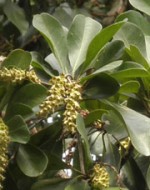 Black olive is an evergreen tree native to Mexico, Central America, the Caribbean, and northern South America but found growing in the brackish marshes of southern Florida. It is no relation to the familiar edible olive but is a member of the Combretaceae family that is usually found in the subtropics and tropics. The gray-brown trunk may have spines and is smooth at first but may become rough or scaly with age. The twigs and branches may also have short spines and the branches may droop but are very break-resistance. The obvate leaves are leathery and two to four inches long. They have blue-green upper sides and chartreuse undersides, and are clustered in whorls at the tips of the branches . Inconspicuous creamy yellow-white flowers are 1/4 “ across, urn-shaped, fragrant, and attractive to bees. They are carried in spikes three to four inches long in spring and give way to reddish-brown to dark brown fruits that are leathery and ½-1/2” long. The trees are tolerant of both seaside and urban conditions and can be used for highway medians or parking lots. They also have an extensive fibrous root system that makes the them valuable for erosion control but the roots are strong and can lift up pavement and damage foundations. The wood is very strong and valued for fencepost as well as other durable construction but is difficult to cut because of its high density. The fruits and leaves may create a litter problem and an exude from the tree may stain pavements.
Black olive is an evergreen tree native to Mexico, Central America, the Caribbean, and northern South America but found growing in the brackish marshes of southern Florida. It is no relation to the familiar edible olive but is a member of the Combretaceae family that is usually found in the subtropics and tropics. The gray-brown trunk may have spines and is smooth at first but may become rough or scaly with age. The twigs and branches may also have short spines and the branches may droop but are very break-resistance. The obvate leaves are leathery and two to four inches long. They have blue-green upper sides and chartreuse undersides, and are clustered in whorls at the tips of the branches . Inconspicuous creamy yellow-white flowers are 1/4 “ across, urn-shaped, fragrant, and attractive to bees. They are carried in spikes three to four inches long in spring and give way to reddish-brown to dark brown fruits that are leathery and ½-1/2” long. The trees are tolerant of both seaside and urban conditions and can be used for highway medians or parking lots. They also have an extensive fibrous root system that makes the them valuable for erosion control but the roots are strong and can lift up pavement and damage foundations. The wood is very strong and valued for fencepost as well as other durable construction but is difficult to cut because of its high density. The fruits and leaves may create a litter problem and an exude from the tree may stain pavements.
Type: Evergreen tree
Outstanding Feature: Foliage; hard wood
Form: Rounded dense canopy
Growth Rate: Slow
Bloom: Three to four inch spikes of inconspicuous creamy yellow-white flowers 1/4 “ across, urn-shaped, fragrant, attractive to bees, in spring
Size: 40-50’ H 35-50’ W
Light: Full sun to part shade
Soil: Average to rich, moist, well-drained
Hardiness: Zones 10-11
Care: Prune for strong structure.
Pests and Diseases: None of significance but susceptible to sooty mold, bark borer, and eryphide mites that cause galls.
Propagation: Seed (difficult), layering
Comments: Black olive is considered a native of Florida by some authorities.